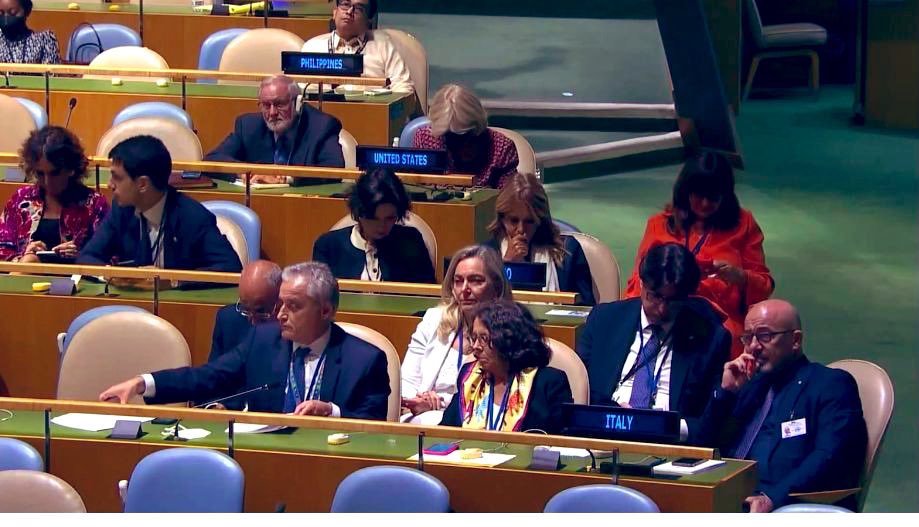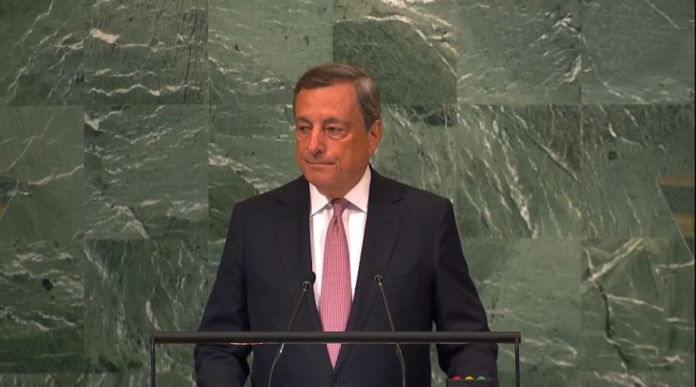NEW YORK, SEPTEMBER 20 – Italy thought that we would no longer have to witness wars of aggression in Europe. Helping Ukraine to protect itself was not only the right choice to make: “It was the only choice consistent with the ideals of justice and fraternity that underlie the United Nations Charter and the resolutions that this Assembly has adopted since the beginning of the conflict”, and Italy “acted without delay, together with the other member countries of the European Union, with its NATO and G7 allies, and with all partners who, like us, believe in a rule-based international system and multilateralism,” said the Italian Prime Minister Mario Draghi addressing today the General Assembly.
 Italy’s commitment to peace, to international solidarity, is unceasing. On this path, the United Nations is the main point of reference, Draghi said. Unprecedented sanctions against Russia, thousands of refugees welcomed into our borders in the name of solidarity. “In the past few weeks, a heroic counteroffensive has allowed Ukraine to recover thousands of square kilometres of territory, starting with Kharkiv, and has forced the Russian army to retreat. The outcome of the conflict remains unpredictable, but Kyiv appears to have gained an important strategic advantage,”I said Draghi, adding that the collective economic measures have had “a devastating effect” on Russia, its ‘war machine’ and its economy.
Italy’s commitment to peace, to international solidarity, is unceasing. On this path, the United Nations is the main point of reference, Draghi said. Unprecedented sanctions against Russia, thousands of refugees welcomed into our borders in the name of solidarity. “In the past few weeks, a heroic counteroffensive has allowed Ukraine to recover thousands of square kilometres of territory, starting with Kharkiv, and has forced the Russian army to retreat. The outcome of the conflict remains unpredictable, but Kyiv appears to have gained an important strategic advantage,”I said Draghi, adding that the collective economic measures have had “a devastating effect” on Russia, its ‘war machine’ and its economy.
 The International Monetary Fund expects the Russian economy to contract this year and the next by about 10 percent in total, compared to around 5 percent growth estimated before the war. The impact of these measures is set to grow over time. “With a weaker economy, it will be more difficult for Russia to respond to the defeats that are piling up on the battlefield”, said Draghi, a former head of the European Central Bank who will leave office after next Sunday’s Italian political election: “Still, Italy remains at the forefront of efforts to try and reach an agreement, when this will become possible”.
The International Monetary Fund expects the Russian economy to contract this year and the next by about 10 percent in total, compared to around 5 percent growth estimated before the war. The impact of these measures is set to grow over time. “With a weaker economy, it will be more difficult for Russia to respond to the defeats that are piling up on the battlefield”, said Draghi, a former head of the European Central Bank who will leave office after next Sunday’s Italian political election: “Still, Italy remains at the forefront of efforts to try and reach an agreement, when this will become possible”.
EU must do more, ‘price cap’ on gas imports
As Italy has long argued, said the Italian premier, the European Union must impose a price cap on gas imports, which will also help us further reduce our payments to Russia:
“Europe must support member states while they support Kyiv”. Draghi stressed that “to date, we have halved our dependence on Russian gas and expect to become completely independent in 2024. On this path, we benefit from the agreements made with many African countries – from Algeria to Angola to the Republic of Congo. We want to develop green technologies together, to put Africa squarely at the centre of the ecological transition”. The war in Ukraine has redrawn energy geography and, with it, geopolitics. “The European Union is set to look increasingly to the south, and Italy can be a bridge to the southern shores of the Mediterranean, to the entire African continent”.
Draghi relaunches Rome EXPO 2030 bid
From the podium of the General Assembly, Draghi relaunched Rome’s bid to host Expo 2030, “to continue to offer shared solutions to global problems.” Despite the divisions of recent months, he stressed, “we have a solid base on which to build. The Italian presidency of the G20 last year coincided with a moment of great collaboration between countries. It is a legacy that we must not dissipate.”
Cooperation on covid and climate
In his address Prime Minister Mario Draghi presented Italy’s efforts against the pandemic and climate change in a framework of international cooperation. “At the most acute stage of the pandemic, we took action to overcome protectionism in medical products and to ensure more vaccines for regions that were not receiving them. To date, the COVAX mechanism has distributed more than 1.4 billion doses of Covid-19 vaccines to the world’s poorest countries. We enhanced financial assistance to vulnerable states to help them respond to the economic consequences of the pandemic and we promoted the extension of the Debt Service Suspension Initiative.”
Draghi, who met today with General Assembly President Csaba Kőrösi, also recalled that “through a newfound spirit of cooperation, we intensified the fight against climate change.
For the first time, all G20 member states pledged to try to keep global warming within 1.5 degrees of pre-industrial levels and accepted the scientific facts behind this goal. We also agreed on a set of short- and medium-term responses to achieve this goal – in addition to the commitments which we made at COP26 in Glasgow.” The premier referred to the devastating floods in Pakistan, and went on to say that “We must continue to support the most vulnerable states to help them defend themselves against the impacts of climate change and to pursue their own transition paths. The environmental crisis affects us all, and we must all come out of it together”.
Draghi calls for UN reform
Italy’s engagement with the UN passes through a reform of the Security Council: “We strongly supportthe need to reform the Council, to make it more representative, efficient, and transparent,” Draghi said, returning to a recurring theme in today’s speeches and one that will also be revived tomorrow by U.S. President Joe Biden. “The war in Ukraine and the resulting crises have strained the cohesion of the international community.
But it is precisely in this context that we need to rediscover the spirit of cooperation that has enabled us in the past to face other, no less difficult, challenges together. Our common institutions must renew themselves.”
The issue of the Security Council reform is on the agenda of a ministerial meeting of Uniting for Consensus Group, chaired by Italy, which is fighting for an increase only in its non-permanent seats. (@OnuItaly)

